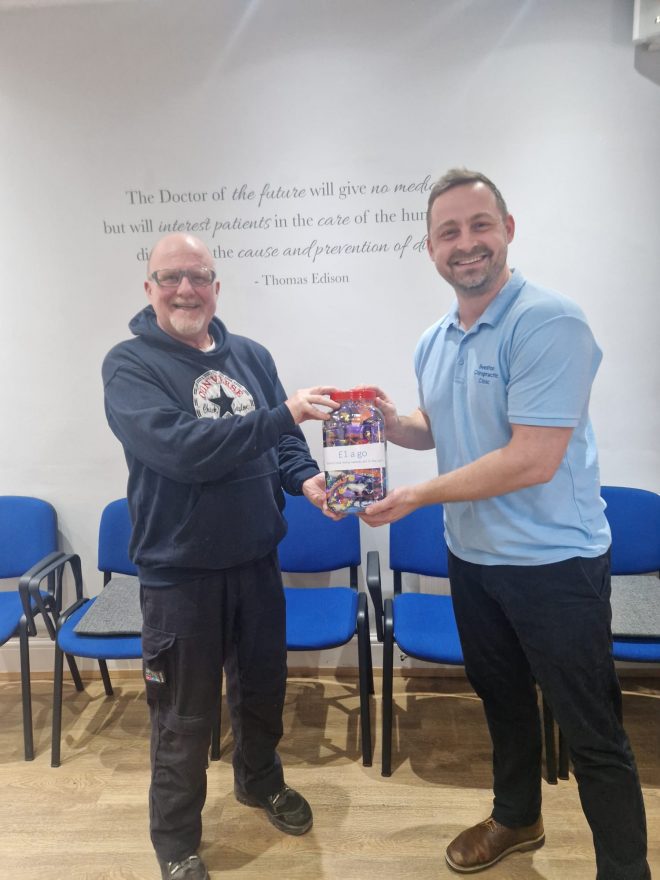
Clinic News
Happy, happy new year! We trust you had a peaceful and memorable Christmas with the ones you love. It is a difficult time of year for many but we hope you feel refreshed and ready to start the new year with renewed energy and positivity.
There will be a small increase in treatment prices from January to £40 - we apologise for this as we are all feeling the squeeze. It's the only way we can continue to provide you with the high-quality service we strive to achieve.
We also welcome Jenny back after her maternity leave to resume her sports massage therapy - her diary is already well stocked up so get your appointments in to avoid disappointment. Ruth and Jo have done a great job looking after Jenny's list. Jo will be continuing to support the team on a Thursday morning and one Saturday a month. We are sure you will join us in congratulating her on becoming a permanent part of the team.
The team will be having a belated Christmas celebration next weekend as we try and get everyone together for a fun night out. - look out for the photos next month and see who wins the bowling.
The winner of the sweetie competition is Luke's patient John Peckham - congratulations John enjoy - there were 199 sweets by the way.
Sue Lacey completed her 100-mile swim in October and generously donated over £200 in sponsorship money to our tree fund, well done Sue - This is a massive achievement. The banked tree fund stands tall at £2,232.71 now.
Save the date we have a provisional date for our 30th party on Saturday 1st April 2023 - it will be from 10 am to 2 pm - fun games, prizes, bubbles and cake included in your ticket - tickets will be available soon. We are asking for gift donations for the prize draw. In 2018 so many local businesses donated amazing gifts - we would like to ask you again for a donation, please. Tickets will also be available for the prize draw in due course.
In this issue we focus on mindfulness and mental health, look out too for top nutritional advice and how to step things up ready for the spring.
Finally, we are still waiting for an update on Erin's arrival - fingers crossed she will join the team in February.

Self-Care
Self-care has now become an overused and confusing buzzword. The consumer wellness industry capitalised on the term to market goods to people wanting to improve their lives in some way.
Something meant for personal growth became the universal word for all types of ineffective coping mechanisms. Self-care should be an individual’s responsibility to find useful resources to thrive in life.
If you find you regularly need to indulge in consumer self-care, you may be disengaged from real self-care, which has little to do with pampering yourself and a lot to do with guiding yourself to make decisions for your long-term wellness.
So, what is real self-care? The answer is entirely up to you, because truly effective self-care begins with meeting your real needs in the moment.
At its core, self-care is the practice of safeguarding your own well-being and peace of mind — particularly during times of stress. Additionally, it’s about identifying the things that bring you happiness and help you to unwind. But really, self-care can be any and everything that adds comfort and removes stress from your life — if even for a little while.
Taking time to cater to yourself is a necessity and enables you to be your most productive, energetic, and all-around happiest self — which in turn helps you be more present for others. It helps you be kinder to yourself and others, enables you to respond better in situations and boosts patience and efficiency. Overall, it improves your mental, physical, and emotional well-being — who doesn’t want that?
In this modern world of striving, excelling, delivering, and juggling it all – it’s important to take a break, assess what is taking up unnecessary time in our schedules and lives, and make a whole lot more room for taking care of our minds and bodies.
The following considerations can help you determine what is an effective self-care activity for you. Maybe you keep coming back to the same ones, or they may be different each time – remember, you’re just giving yourself what you need to regain your energy and ability in that moment.
- How do I feel?
- Why do I feel this way?
- How is my body?
- What do I need?
- How do I want to feel?
Recognising your feelings and what you need to restore your capacity is important for effective self-care.
Check-in with yourself using the questions above daily. Setting aside a little time each day to meet your needs can be beneficial toward maintaining your mental health and well-being.
So go ahead and plan out your self-care for this week.
10 Ways to practise self-care:
- Prioritise your rest, try to get 7-9 hours of sleep.
- Eat balanced meals.
- Think kind thoughts to yourself.
- Learn to say “no” to outings and people that drain your energy.
- Clean your living space.
- Make time for family and friends.
- Get to know yourself more.
- Take in nature, go for a walk.
- Unplug. Take a break from the digital world.

Good nutrition for bones muscles and joints
Good nutrition for bones muscles and joints
Choosing a balanced diet containing the right vitamins and minerals decreases our chances of developing deficiencies later on in life. Try this healthy diet plan for optimum bone, muscle and joint health.
A Healthy Diet Plan
Calcium
For bone, muscle and joint health try and include calcium in your diet, which is essential for optimal nerve and muscle function and blood clotting.
Obtained from:
Dairy products are rich in calcium that is easy to absorb. Non – dairy sources with equally absorbable calcium are green leafy vegetables from the kale family. Spinach, rhubarb, sweet potatoes and dried beans are rich in calcium but from these foods it’s not easily absorbed.
Magnesium
Required for efficient muscle contraction and conduction of nerve impulses. Low magnesium levels in the body can affect the body’s calcium levels, putting bone health at risk.
Obtained from:
Green leafy vegetables, unrefined grains and nuts. Small amounts are present in meat and milk. Large quantities of fibre in the diet and low protein intake can reduce the amount of magnesium able to be absorbed by the body.
Vitamin D
Essential for regulating the formation of bone and the absorption of calcium from the intestine. Vitamin D is a fat-soluble vitamin that functions to help control the movement of calcium between bone and blood.
Obtained from:
Primarily from the action of UVB light (sunshine) on the skin. Food sources such as cod liver oil, sardines, salmon, tuna, milk and milk products contain small amounts of Vitamin D.
Vitamin C
The structure of bones, cartilage, muscles and blood vessels is provided in part and maintained by collagen. The formation of strong efficient collagen requires Vitamin C.
Obtained from:
Citrus fruits, berries, tomatoes, cauliflower, potatoes, green leafy vegetable and peppers. Also important for producing strong collagen and therefore strong bone structure, is Folic acid. Folic acid is found in cereals, beans, green leafy vegetables, orange and orange juice.
Antioxidants
Vitamin C is also a strong antioxidant and is capable of regenerating other antioxidants like vitamin E. The role of antioxidants is to mop up free radicals (the by-products of normal metabolism). Excessive amounts of free radicals cause damage to joint surfaces and muscle cell regeneration. Antioxidants reduce the potential of these free radicals to cause joint damage.
Obtained from:
Antioxidants are vitamins A, C, E and the mineral selenium and are present in fruits and vegetables, the highest quantities are found in the most deeply and brightly coloured. Cartilage that lines the articulating surfaces of all joints is critical to joint health. Cartilage is the shock absorber of joints and is continually rebuilt if a source of raw materials is available. Supplements such as glucosamine sulphate can be added to a healthy diet to assist joints that maybe showing signs of wear and tear.
Essential fatty acids
Essential fatty acids (EFA’s) also reduce the degenerative changes in tissues and cells and help guard against some cancers. EFA’s are unsaturated fatty acids. They aid in decreasing the inflammatory response and help relieve pain and discomfort in joints and muscles.
Obtained from:
EFA’s, such as Omega 3, can be found in oily fish, (sardines, herrings, mackerel), and seeds.
Foods to avoid…
There are certain foods and substances that adversely effect the body’s use of minerals and vitamins. High saturated/animal fats, refined foods, white flour, white sugar, white rice, chocolate, carbonated drinks and fruit juices with high sugar concentration should be kept to a minimum if not weaned from the diet completely. Meat and dairy products should be kept within a recommended weekly amount. Dairy products as calcium sources should be varied with other non-dairy sources.

The art of mindfulness
Whether you have an important work deadline to meet, a dentist appointment to book, or simply remember to pick up milk on the way home, we are all guilty of succumbing to the pressures of a never ending to do list.
With our fast paced and demanding lifestyles, we tend to put the majority of our thoughts to the back of our mind. However, when we are not able to recognise the relevance or influence of individual thoughts they can filter into the physical body as muscle tension or inflammation, which is why local Chiropractor from in recommends the practice of mindfulness.
Mindfulness is the practice of becoming aware of yourself in the present moment, enabling you to identify how you feel inside and out. With this mind-body approach, you can clear your mind of negativity and unnecessary strains and ultimately, help against physical aches and pains.
Mindfulness allows you to understand your pain and teaches you how to let go of any anxiety associated with it, as these thoughts can contribute to increased tension, forming a vicious cycle of increasing pain.
As well as stress and chronic pain, mindfulness can help combat anxiety, sleep and eating disorders. explains, “Mindfulness increases positivity and energy levels which encourage healthier life decisions, improving your overall sense of wellbeing.” So not only are you likely to make better food choices but you should be able to finally relax when it comes to getting a good nights sleep too.
recommends you simply take 10 minutes out of your day to practice mindfulness, by working on five basic tips.
- Sit comfortably and relax
- Focus on your breath
- From your head to toes, bring awareness to each body part
- Identify any sounds or smells and let them pass
- Acknowledge and accept how you feel emotionally

Stepping It Up
It’s recommended that we take 10,000 steps a day. However, a recent study conducted at Stanford University found that the global average for steps taken per day is 4,961. Though the UK’s average is above this stat, it’s a far cry from the suggested amount.

Walking has many benefits, from reducing the risk of heart disease to helping you sleep easy! Where you can, swap walking on pavements for paths in green spaces, you’re likely to improve your mood, get the creative juices flowing and reduce feelings of depression. With so many lovely green areas in and around, a little change in your daily routine can do wonders for your wellbeing!
A good walking technique is key to ensure your back is properly supported. Tighten your stomach muscles to engage your core and support your entire body weight. Spinal alignment is vital; try to stand up straight and keep your chin parallel to the ground. Let your arms swing naturally and roll through your foot from heel to toe.
It’s also a good idea to shorten your strides; this will reduce the strain on your knees, calves and shins. Make sure you get the right technique as you start off so that bad habits don’t develop! Getting the right footwear is key to ensuring you establish a good walking method. When buying shoes you’re going to walk in make sure you go at the end of the day as your feet will be a little swollen meaning you’ll purchase the right size. It’s important that your toes have room to move and that your heel doesn’t slip. This will give you ample support both in your ankle and further up in your lower back.

Try incorporating a walk into your daily routine. By releasing endorphins and boosting vitamin D levels, walking’s benefits are sure to leave you feeling refreshed and energized.
We treat all conditions that affect any muscle or joint in your body, from your head to your little toe! One of the most common complaints that we treat is back pain and Chiropractic is recommended by the government authority, the National Institute for Clinical Excellence (NICE) for acute and chronic back pain. Some of the other conditions that we treat are neck and headache, shoulder pain, leg and hip pain, knee and foot pain, sciatica and arthritis. Our registered Chiropractors all have at least five years of training. Treatment costs can be covered through most health insurers. If you are in any doubt, we are always very happy to talk with you on the phone to see if your condition will respond well to Chiropractic treatment. Call the clinic now to arrange an appointment time that works for you. 0115 9225085 If you would like to opt-out of receiving these newsletters please follow the unsubscribe link below, email alex@beestonchiropractic.co.uk or let us know at your next appointment.







